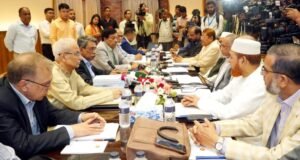 Five people believed to be linked to the man who killed 84 people in Nice are in police custody, the Paris prosecutor’s office says.
Five people believed to be linked to the man who killed 84 people in Nice are in police custody, the Paris prosecutor’s office says.
Three arrests were made on Saturday and two on Friday, including the man’s estranged wife, Le Monde reported.
Mohamed Lahouaiej-Bouhlel drove a lorry into crowds marking Bastille Day on the Promenade des Anglais on Thursday before he was shot dead by police.
So-called Islamic State claimed one of its followers carried out the attack.
A news agency linked to the group, Amaq Agency, said: “He did the attack in response to calls to target the citizens of the coalition that is fighting the Islamic State.”
French Interior Minister Bernard Cazeneuve said Lahouaiej-Bouhlel seemed to have been “radicalised very quickly”.
He said the “new type of attack… showed the extreme difficulty of the fight against terrorism”.
Prosecutors said Lahouaiej-Bouhlel, a 31-year-old Tunisian, drove the lorry 2km (1.2 miles) along the promenade targeting people.
Of the 84 who died, 10 were children. A total of 303 people had been taken into hospital following the attacks, the French health department confirmed on Saturday. Of those, 121 remain in hospital, 30 of whom are children, and 26 people are still in intensive care – including five children.
Stephanie Simpson, from the Lenval children’s hospital in Nice, said one was in a “very bad” condition, three were on artificial respiration, one had been stabilised and one eight-year-old child remained unidentified.
French President Francois Hollande met his defence and security chiefs and cabinet ministers on Saturday.
He called for national unity in France and said: “We are in a time when, and we have seen it, there is a temptation to divide the country.
“Faced with these temptations, faced with this risk, we must recall the unity and cohesion of this country.”
Mr Hollande, who says the attack was a terrorist act, has already moved to extend a state of emergency by three months, and on Saturday France began three days of national mourning.
A state of emergency has been in place across France since the Paris attackscarried out by militants from the so-called Islamic State group. The 13 November attacks left 130 people dead.
Mr Hollande had proposed lifting the state of emergency on 26 July, but reversed his decision after the Nice attack.
Psychiatrist Dr Sylvie Serret treated many people, including children, who witnessed the traumatic attack in Nice, and she feared long-term post-traumatic stress or anxiety would set in, in some cases.
She told BBC News: “I was with people who were in shock, some couldn’t speak or express themselves.”
Meanwhile, France’s National Front leader Marine Le Pen has called for national service to be brought back, and a national guard to be created to protect France in the wake of Nice attacks.
Speaking in Nanterre, on the outskirts of Paris, the far-right leader also called for the budget for the armed forces to be increased.
Some 30,000 people were on the Promenade des Anglais at the time of the attack on Thursday night.
Residents of Nice and foreign tourists were killed, among them four French citizens, three Algerians, a teacher and two schoolchildren from Germany, three Tunisians, two Swiss, two Americans, a Ukrainian, an Armenian and a Russian.
On Thursday, in his Bastille Day interview, President Hollande announced with satisfaction that with new laws recently enacted against terrorism – and with extra resources for the police – it was finally time to end France’s eight-month state of emergency.
But just a few hours later, in the wake of the Nice attack – he had changed his mind.
It’s just this sense of uncertainty and vacillation at the top that the opposition has turned its sights on, with right-wing leaders quite openly breaking the customary post-terror political truce.
In varying degrees of outspokenness, they all accuse the president of failing to grasp the scale of the Islamist threat, and of indulging more in communication than action.
Some of this may be unfair – it’s hard to see how even the most sophisticated security set-up could have stopped the Nice atrocity.
But the opposition is not wrong in sensing the public anger- and elections are only nine months away.
There was a visible security presence in Nice on Saturday morning and soldiers were patrolling the front of the main train station Gare De Nice Ville.
Stallholder Romain Ribero said France was used to high security in the wake of last year’s Paris attacks.
“We feel safe. My children and my wife live here. We feel secure. I am already hurt after Paris, but we must go on,” said the 37-year-old, who lost two friends in the November shootings.
Lahouaiej-Bouhlel was known to the police as a petty criminal, but was “totally unknown to intelligence services… and was never flagged for signs of radicalisation,” prosecutor Francois Molins said.
However, Prime Minister Manuel Valls said he was “in one way or another” linked to radical Islam and Paris prosecutor Francois Molins said the attack bore the hallmarks of jihadist terrorism.
A neighbour of Lahouaiej-Bouhlel, who used to live in a high-rise block of flats on Boulevard Henri Sappia with his family, said he did not believe the 31-year-old was involved with IS.
Samiq, who did not want to give his surname, told the Press Association news agency: “I never saw him going to the Mosque. He was not a Muslim. During Ramadan I saw him smoking.”
Speaking in Nice, the president of the Regional Council for the Muslim Faith, Boubakar Bekri, said mosques in the area had responded to the attack.
“Yesterday in all mosques in the region of Alpes-Maritimes, there has been a common prayer calling for vigilance and patience, because these very bad events affect us; and there has been a call for blood donation,” he said.
 Weekly Bangla Mirror | Bangla Mirror, Bangladeshi news in UK, bangla mirror news
Weekly Bangla Mirror | Bangla Mirror, Bangladeshi news in UK, bangla mirror news






